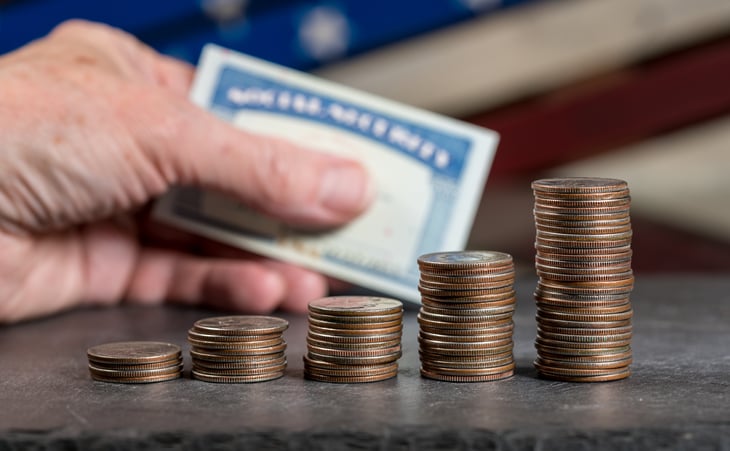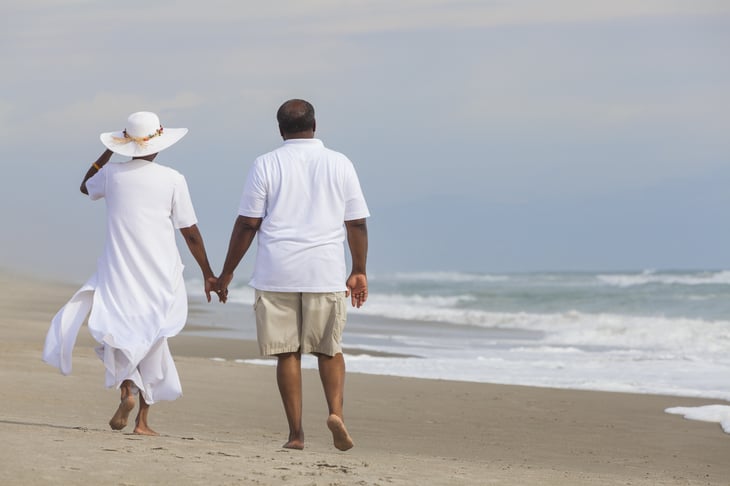
Editor's Note: This story originally appeared on NewRetirement.
Early retirement — retiring at age 62 or before — seems like a wonderful dream to a lot of people.
You’ve been in the workforce for decades. You have focused on work with the goal of enjoying the rest of your life on your own terms. But is it too early to get out of the rat race? Retiring at 62 is quite a bit different (good and bad) than retiring later.
Is it time to walk away from work and into retirement? If you’re wondering whether it’s the right thing for you to do, this is not intended to slow you down.
In fact, the following are several reasons why you should go ahead and retire at 62 — or earlier.
1. Retire early if you want to stay healthier longer

There’s no doubt that working and being active can help you stay healthy much longer than sitting with your feet up. But not all work is good for you; sometimes, it’s detrimental to your health.
Retiring at 62 from a backbreaking job or one with a disproportionately high level of stress can help you retain, or regain, your good health and keep it longer.
Just be sure to have a plan for remaining mentally, socially and physically active. Jobs are good for keeping you engaged, but they are not the only way to remain occupied.
2. Retire at 62 (or earlier) if you know what else you want to do

Do you have a dream that you’ve always wanted to pursue, but never had the time? Maybe you want to write a novel. Have you toyed with the idea of joining the local community theater?
Or perhaps you’ve always wanted to grow your own food on a farm. Maybe you want to raise sheep, harvest the wool and open a yarn shop.
If you have a real goal and you know you’re passionate about it, you’ve got a good reason to retire early. (Not yet sure what you want to do? Here are 120 ideas for what to do in retirement.)
It’s said that no one ever reached very old age regretting the things that they did. Regrets come from the things not tried, the chances not taken, the dreams left dusty and neglected on a shelf.
If you are able, retiring at 62 can give you many years to seek out that dream and really enjoy it.
3. Retire early if you can feel secure

Having the means and having security are a bit different. You might have enough to retire on, including early Social Security benefits, but can your finances withstand an unforeseen upheaval?
If you’ve got the early years of retirement covered and will have access to more financial security as you get older, you’ve got little reason to hold back on retiring early.
4. Retire early if you are ready to focus on a financial goal

Maybe you aren’t quite financially ready to retire early. Should this hold you back? Absolutely not — especially if you are ready to focus on a financial goal.
Most Americans are unprepared for retirement and may need to continue working during their 60s and beyond. However, don’t let past mistakes or lack of planning and saving hold you back now!
Set a goal to retire early, start analyzing your finances and design a plan to get out of the workforce as soon as you can. The sooner you make an effort to retire early, the sooner you will be able to do it.
The NewRetirement Planner makes it easy to get started. Try different scenarios and find your path to retirement as early as possible.
5. Retire at 62 if you want to learn new things

If you devoted your education and life to a focused career, there might come a point when you want to try something completely new.
Taking retirement at 62 means you have time to pursue education in a different direction, and still have time to use and enjoy it.
Adult students typically perform better than their younger counterparts.
And even if you don’t pursue a new degree to use in the workforce, learning for personal edification can be rewarding. You might even gain a new skill set to use in starting a business of your own.
6. Retire early if you’ve really thought it through

Early retirement isn’t something to enter into lightly. You might have your finances in order, but you also need a solid understanding of how your life will change.
For example, it can be more stressful than you imagine, spending every hour of every day with your spouse, especially if you’ve only spent a few hours together daily in the past.
For someone who is accustomed to going to work Monday through Friday, the sudden change of not having a schedule and everything that accompanies it can be difficult to deal with. If this is you, perhaps you might want to try a sabbatical instead of an early retirement.
However, if you’ve already done your homework and are just waiting for 62 to arrive, then there’s nothing holding you back.
7. Retire early if you don’t need to start collecting Social Security early

The earliest you can generally start Social Security benefits is age 62. However, just because you can start benefits does not mean that you should.
Your monthly Social Security benefits check increases significantly for every year you delay claiming, up until age 70. So, if you are planning on an early retirement, it is best to do so without starting Social Security.
8. Retire early if you are ready to simplify

Living more frugally is not an absolute necessity in retirement. But if you think that you can simplify your spending, then you can probably retire at 62 or earlier if you really want to.
When you retire, you have the opportunity to prioritize what is important to you and let the rest slip away. Prioritization can help you reduce spending levels, and can be incredibly freeing.
9. Retire early if you have a plan for health insurance

When you retire at 62, there are still three years left to wait before you’ll qualify for Medicare, the federal health insurance program, unless you qualify due to a disability. You’ll need medical coverage to see you through until you turn 65.
Being healthy doesn’t mean it’s OK to go without health coverage. If you can obtain a policy to bridge the gap, then you’re all set. If not, you might want to wait a bit longer to retire.
Here are a few ideas for how to afford health care before Medicare eligibility.
10. Retire early if you’re (almost) debt-free

Probably the biggest indicator that it’s really OK to retire early is that your debts are paid off, or very close to it.
Debt-free living, financial freedom or however you choose to refer to it means you’ve fulfilled all or most of your obligations, and you’ll be under much less strain in the years ahead.
If you’re debt-free and your retirement income is in line, there’s little reason to continue working if you don’t want to. This is the time of life that you’ve worked hard to reach. So, go out there and enjoy it.





Add a Comment
Our Policy: We welcome relevant and respectful comments in order to foster healthy and informative discussions. All other comments may be removed. Comments with links are automatically held for moderation.